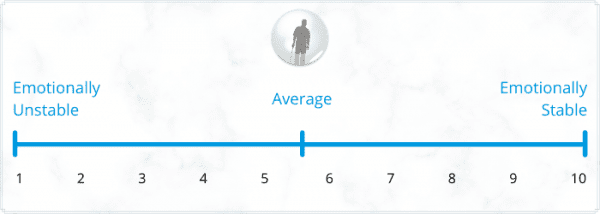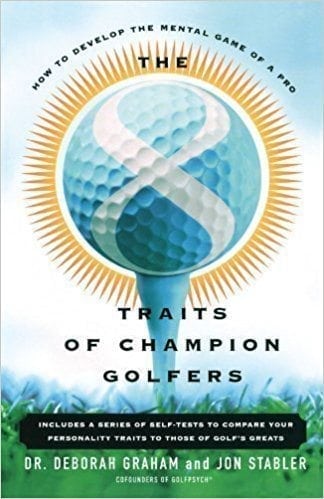“As a matter of fact most of the difficulties in golf are mental, not physical; are subjective, not objective; are created phantasms of the mind, not the veritable realities of the course.”
Arnold Haultain, from THE MYSTERY OF GOLF, 1908.
In The Mystery of Golf, Arnold Haultain proposes that “a veritable demon seems to enter a golfer on the links”. He asks, “what otherwise would cause a golfer to transgress from even the most elementary rules… such as keeping the eye on the ball…or refraining from ‘pressing’ or ‘hurrying the stroke?’.
Top golfers with a strong understanding of the mental game of golf have identified this “demon” within them as their own performance inhibiting emotions.
This is not to say that all emotion is bad. Emotion is what fuels your passion for the game; your unrelenting desire to hit a longer drive, a more accurate approach, and a more certain putt. The emotions that hurt your performance are the emotions of anger, frustration, disappointment, stress, insecurity, low confidence, bad attitudes or the more positive emotions of excitement, elation, and anticipation. These emotions can alter your body chemistry and influence brain wave patterns, both of which can directly interfere with your natural and trained athletic skills.
Understanding and dealing with your emotions—not suppressing or repressing them—is extremely important for competitive golf. The other seven Champion personality traits can be weakened by your emotions:
Focus: Your ability to narrow your focus over the ball is lost as your emotions distract you from using your mental routine.
Abstract Thinking: Your mind gets busier and your thoughts, skewed by emotions leaving you far less clear in thought to make club selections, choose targets, or create shots.
Dominance: A good competitive and moderately aggressive attitude can be made too aggressive with anger or too tentative with fear.
Tough-mindedness: The strong, tough, resilient competitor can be reduced to a sensitive, uncertain player if he is overcome by emotions during an important round.
Self-confidence: Emotions which lead to negative and degrading self talk quickly lower personal and/or performance confidence.
Self-sufficiency: Even the best decision-makers find their abilities reduced when they experience extreme anger, fear, frustration, etc.
Optimum Arousal: Tension levels climb rapidly as body chemistry changes with extreme emotions.
Your ability to monitor and control your emotions is determined by various factors including: your personality, your current life circumstances, your physical health and energy levels, your attitude, your expectations, and even your diet. For these reasons the ability to remain emotionally stable and somewhat emotionally detached from a round of golf varies from player-to-player and from day-to-day. The constant we have found with this trait is that Champions play with above average emotional stability, and that they use mental techniques for helping them do so.

Assess the levels of emotion you experience during competition. Rate your emotional stability on this scale. Professional golfers must be above average on the Emotionally Stable side to afford themselves any chance of attaining “The Zone” during competition.
1-4 – Feels emotion deeply and often; may frequently experience uncontrollable anger, frustration, or fear; becomes very emotionally involved in his play, reacting to many shots and putts during competition; places too much emphasis on issues that lie outside of his control, like what other players are doing, or why the wind had to pick up on his toughest holes.
5-6 – Feels some negative emotion during competition; may allow bad conditions, bad weather, slow play, etc. to be a steady source of irritation; may react strongly to some bad shots or putts, sometimes dismissing the emotion before hitting the next shot and sometimes carrying it over into the next several shots; some emphasis on issues that lie outside of his control, like how crummy the weather is.
7-10 – Usually very emotionally even on the course; good at emphasizing issues that are within control, like putting a great stroke on this putt, and de-emphasizing issues that are outside control, like how many spike marks are between the ball and the hole; reaction to shots and putts is mild.
Identify your Reason for Playing Golf
Why are you playing competitive golf? You may find yourself feeling and saying such things as: “It’s my job, I have to play.” “I don’t know what else I would do.” “How else can I make this kind of money.” “I have to prove something to a few people.” “This is what I’m expected to do.” “I need the money.” “Golf is who I am. I have to play and I have to play well.” If you are playing primarily for one or more of these reasons you probably feel excessive emotion during competition and you are no longer enjoying competitive golf.
Consider your reasons for playing. Reflect on your original primary reasons for playing golf. Try to establish a healthier purpose, or mission for playing golf, such as: for your love of the game; for the challenge and competition; for the opportunity to be your own boss and to be outdoors. If you find this difficult, talk with someone neutral and unbiased for the purpose of understanding how golf has come to be a “job” for you and how you can get back to the simple priority of enjoying what you do.
Understand the Sources of Your Emotion
Current Life Circumstances
Many circumstances of life such as death of a loved one, financial loss, personal or family accidents and illnesses, money pressures, marital strife, etc. will elevate your emotions. It is normal to react to these difficult life circumstances with emotion. Experience and work through these emotions rather than suppressing them to ensure that they do not surface in another form during the pressures of competition. Counseling can facilitate and speed you through this process.
Expectations – Focus on the Process
There are many expectations that become emotional traps for the unaware. They will stir up subtle to extreme emotions of desire, longing, anticipation, frustration, depression and anger which can make it impossible to play in “The Zone”. You can avoid letting expectations become emotional traps for you.
One of the most common mental mistakes you can make is to let yourself be pulled into thinking predominantly about OUTCOME instead of PROCESS. Unless a player is extremely confident and at peak performance, outcome thoughts will incite tension and emotion. You can avoid this while you compete by setting PROCESS goals (mental routine, regulate thoughts, visualize putts) instead of letting yourself think of OUTCOME (score, money, stats, position). Common thoughts that lead to outcome thinking include: “I’ve been dieting, working out, working hard on my game so I should see some good numbers this week.” “I’ve got to make a check this week, I need the money badly.” “Everyone from my club will be here this week—I’ve got to play well.” “I have to make this cut to keep my card, that’s all!”
Replace these with thoughts that lead to process thinking: “I will take a deep breath before each shot to be sure I relax and visualize all of my targets today.” “I will give myself an opportunity to finish in the money by using a solid mental routine for every shot.” “I will show everyone here how strong my mental game is by using my mental routine and regulating my thoughts between shots all day.” “I will play strong mentally all day and let outcome take care of itself”. “I have a back-up plan for playing next year (if I do not keep my card), so today I will put outcome aside and just play”!
“…there’s no doubt that a certain amount of fatalism regarding the game has contributed heavily to my career, by helping me handle the hard fact that you are always going to lose more than you win.”
-Jack Nicklaus
Perfectionism in Golf
When players go into competition with expectations of hitting perfect shots and making perfect putts, ball-striking becomes more important than actually playing. Natural human limitations, and the improbability of hitting perfect golf shots—especially in competition— make players of this mindset extremely vulnerable to their emotions.
Perfectionists experience extreme emotion—anger, frustration, disappointment. They must consciously determine for themselves reasonable and realistic margins of error for competition in order to manage these emotions. Consider the following: the BEST player on Tour, in terms of accuracy off the T, missed the fairway 20% of the time; he missed the green in regulation 25% of the time; and he averaged 1.7 putts per green.
On a moderately difficult course, with good conditions, a healthy body, a sharp physical game, a strong mental game, and exceptionally good luck, you should expect margins of error larger than these percentages. Now factor in the difficulty of the course, the true conditions, average luck, your health, the current strength of your physical and mental games (it helps to rate both your mental and physical games on a 1 to 10 scale) and you should come up with an even greater margin of error that you should readily accept for this round. As you enter competition, anticipate the best but be prepared to accept your predetermined percentage of less-than-desirable shots and putts.
Pain and Fatigue
Pain and fatigue can increase irritability, reduce patience and increase negative emotions during competition. Playing with pain is a common occurrence among professional golfers. We will devote a future issue of GolfPsych Update to the discussion of mental techniques for avoiding injury and for dealing with the mental distraction of pain.
Fatigue is more manageable in that you can plan your time, balancing practice and competition with rest and relaxation. Tour players frequently overplay in an attempt to improve their position on the money list. If you have played numerous weeks in a row and find yourself impatient and edgy, remind yourself that a week off will probably net you more than playing straight through because it will allow you to return to play with greater emotional stability.
Diet and Body Chemistry
Each of us has a unique body chemistry which plays a role in determining how much or how little we experience emotion. Players who have sincerely tried mental techniques to stabilize emotions and have not had success should consider checking for biochemical influences. A good diet, exercise, and supplements can help you regain control over your own emotions when body chemistry is a contributor or cause. Hyperactivity and Hypoglycemia are two of the most common disorders we have found that influence the emotional stability of professional golfers.
Hypoglycemia (low blood sugar) — Related to over-secretion of insulin by the pancreas and can be caused by inadequate diet or excess stress.
Common Symptoms may include: restlessness, fatigue, anxiety, dizziness, headaches, irritability, depression, craving for sweets, impaired memory.
Common Causes: poor diet or excess dietary sugar; food allergies; too much alcohol, caffeine or nicotine; stress; exhausted adrenals and liver damage; hypothyroidism; irregular and large meals.
It is suggested that you avoid sugar, refined and processed foods, white flour, soft drinks, and salt. Caffeine, alcohol, and cigarette smoking can result in profound swings.
Try to eat at least 5 small meals per day; do not go long periods without food—carry nutritious snacks on the course with you.
If you think you may experience hypoglycemia, it is recommended that you ask your doctor for a 6 hour glucose tolerance test . The 2 and 4 hour tests don’t always reveal the subtle drops in blood sugar you may be experiencing.
Hyperactivity — Related to the central nervous system.
Common Symptoms: may include emotional instability, quick temper, impatience, poor concentration, high drive, tension, inability to relax, and sleep disturbances. Common Causes: mineral deficiencies; malnutrition from too many refined and junk foods; intolerances to preservatives and additives; hypoglycemia; some prescription drugs; pesticides.
Symptoms can be made worse by sugar, caffeine, chocolate, luncheon meats, hot dogs, fats, and fast foods. Foods recommended include: fresh fruits, fresh vegetables, cereals, whole grain breads and pastas. Important supplements are: calcium, magnesium, Vitamin E, Vitamin C and Vitamin B Complex.. Consult a certified nutritionist.
De-Emphasize What Your Cannot Control
You cannot control the weather, bad bounces, poor conditions, pairings, tee times, what other players do, or luck, etc. You do have a choice about how you view them and this choice leads to the emotional stability, or instability, that you experience on the course. Following are suggestions for handling some of the emotion provoking issues for which you have little or no control.
Unpleasant Pairings — Some personalities combine well, some do not. Rather than dread your pairing or anticipate frustration, look forward to a day to yourself. Be prepared to detach or go into your own “bubble” where you daydream or small-talk with your caddy, scorekeeper, or others between shots and literally look away as your playing partner hits or putts. Limit your mental involvement with the player to simple professional courtesies
Bad Weather and Poor Conditions — When Dave Stockton is questioned about bad weather before a round he usually comments, “Hey, this is great! This will take a lot of guys right out of it”. One of his best techniques for maintaining emotional stability is finding and keeping a positive outlook on things that others would perceive in a negative way.
Bad Luck — Natural laws of probability indicate that, over time, good luck and bad luck will even out. If a player truly believes that he is unlucky and anticipates being unlucky, the odds of his being unlucky are increased by “self-fulfilling prophesy”. Feeling unlucky, jinxed, or hexed all creates emotional instability and lowers performance. The player who feels very unlucky generally perceives himself as a victim of life, usually because of some past, unresolved negative experiences. Counseling can help this player understand and resolve the past issues that are influencing his views today.
Emphasize What You Can Control
Each and every time you prepare for competition, your thoughts and energies should go to the areas you can influence and control, namely your mental game. You can determine a strategy for managing the course, an attitude to take into competition, whether you will react to shots, what you will think about between shots, and the precise steps of your mental routine. Set goals such as these for every competitive round you play and you will find the task of managing your emotions much easier, your competitive golf more fun, and your scores lower.
Playing Golf With Emotional Stability
Every golfer is effected by their emotions. The degree that your emotions effect your play is controllable. Become aware of the effect your thoughts have on your emotions and the effect your emotions have on your play.
Thoughts of outcome and perfectionism, current life circumstances, pain or fatigue, diet and body chemistry all effect your emotional stability. Appropriate steps must be taken to deal with each.
Don’t allow anything beyond your control to effect your emotions. Focus on what you can control and enjoy the process!
The first step towards improving your mental game is our Golf Mental Skills assessment. This assessment allows you to see exactly how your mental game aligns with Tour Champions, and provides personalized recommendations to improve your game.
To go faster and more thoroughly you can attend one of our Weekend Mental Game Schools near San Antonio. You will get 15+ hours of coaching on course and in the classroom, and is the most efficient way to improve your mental game.



